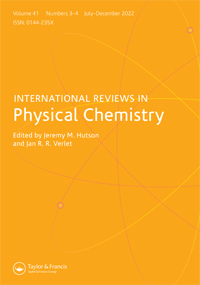Vibronically coupled states: computational considerations and characterisation of vibronic and rovibronic spectroscopic parameters
IF 2.5
2区 化学
Q3 CHEMISTRY, PHYSICAL
引用次数: 2
Abstract
The interaction of electronic and nuclear motion – broadly categorised as ‘vibronic coupling’ – plays a number of roles in areas that range from molecular dynamics to electronic spectroscopy. Additionally, these phenomena pose significant challenges to both computational electronic spectroscopy and quantum chemistry, as the usual approximations (Franck–Condon and Born–Oppenheimer) are often rendered unsatisfactory. After beginning with a broad overview of vibronic coupling effects and some computational strategies for characterising them, the review discusses how these effects are manifested in various types of spectra. Particular emphasis is given to fine-structure effects in Jahn–Teller systems that arise from couplings involving rotational, orbital and spin angular momenta. Unlike overall vibronic level structure, which has been quite well studied both theoretically and experimentally, these more subtle effects are seen only at high (rotationally-resolved) resolution, and are less well understood. The review gives a detailed description of the quantum-mechanical origin of these splittings and provides some computational strategies for predicting them. A broad overview is given of families of Jahn–Teller active molecules that have been investigated experimentally and theoretically. Detailed discussion is given for two JT-active radicals where theory and experiment are compared at both low and high resolution: cyclopentadienyl (C H ) and methoxy (CH O).振动耦合态:振动和回振动光谱参数的计算考虑和表征
电子和核运动的相互作用——大致被归类为“振动耦合”——在从分子动力学到电子光谱学等领域发挥着许多作用。此外,这些现象对计算电子光谱学和量子化学都提出了重大挑战,因为通常的近似(frank - condon和Born-Oppenheimer)往往不能令人满意。在广泛概述了振动耦合效应和表征它们的一些计算策略之后,本文讨论了这些效应如何在各种类型的光谱中表现出来。特别强调的是精细结构效应的Jahn-Teller系统产生的耦合涉及旋转,轨道和自旋角动量。与已经在理论和实验上得到很好研究的整体振动水平结构不同,这些更微妙的影响只能在高(旋转分辨)分辨率下看到,并且不太容易理解。这篇综述详细描述了这些分裂的量子力学起源,并提供了一些预测它们的计算策略。本文对已有实验和理论研究的jann - teller活性分子家族进行了综述。本文对环戊二烯基(hc)和甲氧基(CH O)两种jt活性自由基进行了详细的讨论,并在低分辨率和高分辨率下对理论和实验进行了比较。
本文章由计算机程序翻译,如有差异,请以英文原文为准。
求助全文
约1分钟内获得全文
求助全文
来源期刊
CiteScore
14.20
自引率
1.60%
发文量
5
审稿时长
1 months
期刊介绍:
International Reviews in Physical Chemistry publishes review articles describing frontier research areas in physical chemistry. Internationally renowned scientists describe their own research in the wider context of the field. The articles are of interest not only to specialists but also to those wishing to read general and authoritative accounts of recent developments in physical chemistry, chemical physics and theoretical chemistry. The journal appeals to research workers, lecturers and research students alike.

 求助内容:
求助内容: 应助结果提醒方式:
应助结果提醒方式:


